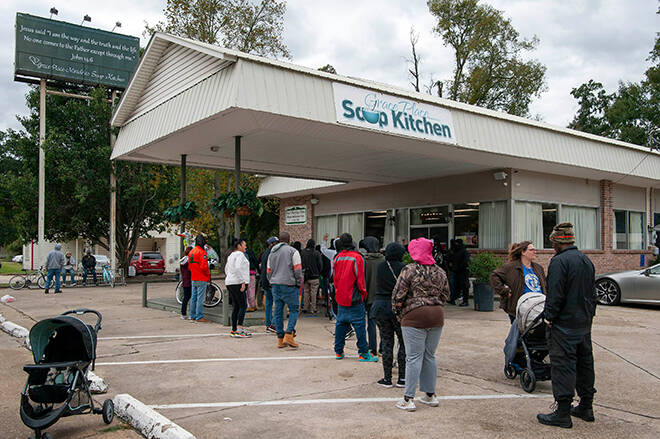Business
Uncertainty Grows for Millions Awaiting Food Stamp Assistance

As November approaches, many low-income Americans face uncertainty regarding their food assistance from the federal government. Individuals like Christine Tully, a 78-year-old great-grandmother from Miami, worry that they may not receive their monthly support of $285 from the Supplemental Nutrition Assistance Program (SNAP). “I’m just so confused,” Tully expressed, reflecting the anxiety shared by millions who depend on this critical aid.
A ruling from a federal judge in Rhode Island added to the confusion. On October 27, 2023, the court ordered the Trump administration to continue funding SNAP during the ongoing government shutdown. The judge found the administration’s refusal to utilize emergency funds to support the program unlawful. Following the ruling, President Donald Trump announced that funding would be provided for November, but warned of inevitable delays. He stated on social media, “It is already delayed enough due to the Democrats keeping the Government closed through the monthly payment date.”
Concerns about disruptions to SNAP extend beyond immediate funding issues. The program typically relies on a collaboration between state agencies, grocery stores, and the federal government to disburse benefits. Advocates fear that the ongoing shutdown could exacerbate conditions for the most vulnerable populations. Robyn Hyden, director of Alabama Arise, articulated this anxiety, saying, “It feels like we’re standing on the shore, and we see a tidal wave coming.”
The impact of the government shutdown is widespread, affecting numerous federal programs that provide vital support to millions. Without stable funding, approximately 6.7 million women and children who rely on the Women, Infants, and Children (WIC) program may lose access to essential services, including infant formula and nutrition support. Furthermore, nearly 6 million households could face increased heating costs or service cutoffs under the Low Income Home Energy Assistance Program as colder weather approaches.
The disruption to SNAP is compounded by sweeping changes initiated by the administration’s domestic policy law, which cut federal spending on Medicaid by roughly $1 trillion and on SNAP by $186 billion. These changes, effective from October 28, 2023, introduce more stringent work requirements and reduce eligibility, which could lead to millions losing access to these vital programs over the next decade.
As officials and advocates scramble to find alternatives for those impacted, the situation remains precarious. In previous government shutdowns, concerns over SNAP were less pronounced due to shorter durations and a general expectation that funding would continue. However, the current landscape has shifted, leaving many in a state of uncertainty.
Historically, the Food Stamp Act of 1964 ensured continuous benefits, but the current shutdown has disrupted this norm. Christopher Bosso, a professor of food policy at Northeastern University, noted, “There’s always — always — some money.” Yet, the Trump administration has claimed that safeguarding SNAP benefits is beyond their control.
Legal challenges from various states and advocacy groups have emerged, arguing for the necessity of preserving these benefits. Judge Indira Talwani of the U.S. District Court for the District of Massachusetts has required the administration to outline its funding plans for November. Similarly, Judge John J. McConnell of the U.S. District Court for the District of Rhode Island stressed the need for timely distribution of contingency funds to ensure recipients receive their benefits.
In Durham County, North Carolina, where around 32,000 residents rely on federal food assistance, the local social services office is experiencing an influx of inquiries. Director Maggie Clapp described the urgent concerns of residents asking, “How am I going to feed my family? What am I going to do?” The uncertainty surrounding food assistance has left many in crisis, highlighting the urgent need for clarity and stability in federal support systems.
As the situation evolves, the ramifications of the shutdown underscore the critical importance of effective government support for those in need. The coming weeks will determine how effectively the administration can navigate these challenges and provide the necessary assistance to millions of Americans reliant on food stamps and other social safety net programs.
-

 Sports3 weeks ago
Sports3 weeks agoSteve Kerr Supports Jonathan Kuminga After Ejection in Preseason Game
-

 Top Stories1 week ago
Top Stories1 week agoMarc Buoniconti’s Legacy: 40 Years Later, Lives Transformed
-

 Politics3 weeks ago
Politics3 weeks agoDallin H. Oaks Assumes Leadership of Latter-day Saints Church
-

 Science3 weeks ago
Science3 weeks agoChicago’s Viral ‘Rat Hole’ Likely Created by Squirrel, Study Reveals
-

 Lifestyle3 weeks ago
Lifestyle3 weeks agoDua Lipa Celebrates Passing GCSE Spanish During World Tour
-

 Business3 weeks ago
Business3 weeks agoTyler Technologies Set to Reveal Q3 2025 Earnings on October 22
-

 Lifestyle3 weeks ago
Lifestyle3 weeks agoKelsea Ballerini Launches ‘Burn the Baggage’ Candle with Ranger Station
-

 Entertainment3 weeks ago
Entertainment3 weeks agoZoe Saldana Advocates for James Cameron’s Avatar Documentary
-

 Health3 weeks ago
Health3 weeks agoRichard Feldman Urges Ban on Menthol in Cigarettes and Vapes
-

 Health3 weeks ago
Health3 weeks agoCommunity Unites for Seventh Annual Mental Health Awareness Walk
-

 World3 weeks ago
World3 weeks agoD’Angelo, Iconic R&B Singer, Dies at 51 After Cancer Battle
-

 Business3 weeks ago
Business3 weeks agoMLB Qualifying Offer Jumps to $22.02 Million for 2024









